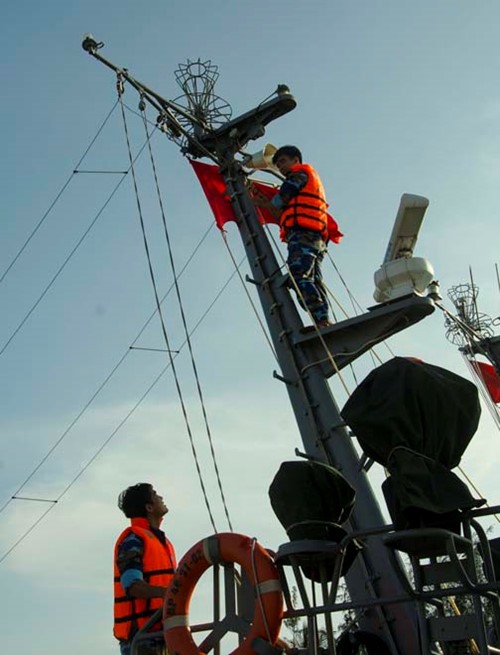 Society
Society

The unfavourable working conditions at sea have forced Vietnamese naval guards to come up with brave and inventive ways to fight maritime smuggling.
 |
| Naval guards under the Việt Nam Border Defence Force practice climbing a flag pole to fight oil smuggling container ships. — Photo thanhnien.vn |
HCM CITY — The unfavourable working conditions at sea have forced Vietnamese naval guards to come up with brave and inventive ways to fight maritime smuggling.
Maritime smuggling has been a pressing issue in Việt Nam in recent years. Some 2,700 suspects were seized in 2016 for illegal trading, with some VNĐ415 billion (US$18 million) confiscated, according to Việt Nam Border Defence Force drugs and crime prevention statistics.
Oil is one of the most frequently smuggled goods at sea. It is often delivered from Cambodia, Thailand, the Dominican Republic, Mongolia, Malaysia and China to the waters off the central province of Quảng Ngãi, Bình Định, and Phú Yên and the southern province of Bà Rịa-Vũng Tàu.
Seizing oil smuggling ships requires coordinated efforts from naval guards both at sea and on the mainland. At 9pm on June 8, right when the seafood vessel KH 94545 TS started sailing off the Đá Bạc fishing port in Khánh Hoà Province’s Cam Ranh District, Lieutenant Trương Quang Học – disguised as a fisherman – picked up the phone and announced to his team: “Target’s moving.”
When the vessel reached the middle of the sea, it was approached by a smaller patrol ship. Two border guards and one anti-smuggling customs official jumped from the ship to the vessel, seizing 48,000 litres of illegally-traded diesel oil.
Similar vessels, which often go undercover as seafood trading vessels, have become the “traces” that naval guards follow to track the whereabouts of foreign oil smuggling container ships in the waters of the central region.
These container ships, carrying some millions of tonnes of oil, often wait until there are storms and big waves to enter Việt Nam. The naval patrol ships cannot rival container ships that weigh thousand tonnes and are designed to endure extreme weather.
Understanding their disadvantage, Vietnamese naval guards are prepared to risk it all when encountering those containers. On the night of December 4, 2016, a naval guard patrol ship approached the Dominican container ship Swift in the waters off central Phú Yên Province under heavy rain and strong winds.
Carrying some 4,300 tonnes (5.9 million litres) of RON92 oil, Swift was a mobile oil vendor, running near the coasts at 1.8km per hour and contacting smaller ships to sell oil right on the sea.
As the patrol ship headed towards the container ship and signaled for it to stop, Swift sailors thought the vessel wanted to buy oil. But as soon as they saw the words Border Guard painted on the side of the ship, they accelerated in an attempt to run away, creating big waves that slapped against patrol boat, which was only 22m long and 4.5m high (from its deck to the top of its flag pole).
As their patrol ship swung violently, naval guards found it hard to maintain balance and climb over the container ship. They decided to climb the flagpole and jumped from there.
Commander Bùi Đình Quang swung an AK 47 over his shoulders, climbed up the pole with his teammates and clung onto it for dear life as a naval leader shouted through his walkie-talkie from mainland: “Only jump when it’s safe!”
When the two ships crashed against each other and made a shrieking sound, all the officers jumped from the top of their flagpole to the Swift to the amazement of its sailors.
The officers then seized all the smuggled oil.
“There are all kinds of odds we face on our sea-guarding missions,” said Commodore Phạm Văn Thủy, captain of the naval squadron 48 under the Việt Nam Border Defence Force. “But our minds are made up: we will do everything to fight smuggling and protect our sea,” he said. — VNS




